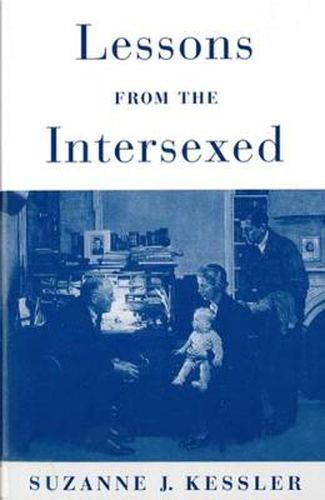Readings Newsletter
Become a Readings Member to make your shopping experience even easier.
Sign in or sign up for free!
You’re not far away from qualifying for FREE standard shipping within Australia
You’ve qualified for FREE standard shipping within Australia
The cart is loading…






From the moment intersexuality-the condition of having physical gender markers (genitals, gonads, or chromosomes) that are neither clearly female nor male-is suspected and diagnosed, social institutions are mobilized in order to maintain the two seemingly objective sexual categories.
Infants’ bodies are altered, and what was
ambiguous
is made
normal.
Kessler’s interviews with pediatric surgeons and endocrinologists reveal how the intersex condition is normalized for parents and she argues that the way in which intersexuality is managed by the medical and psychological professions displays our culture’s beliefs about gender and genitals.
Parents of intersexed children are rarely heard from, but in this book they provide another perspective on reasons for genital surgeries and the quality of medical and psychological management. Although physicians educate parents about how to think about their children’s condition, Kessler learned from parents of intersexed children that some parents are able to accept atypical genitals. Based on analysis of the medical literature and interview with adults who had received treatment as interesexed children, Kessler proposes new approaches for physicians to use in talking with parents and children. She also evaluates the appearance of a politicized vanguard, many of who are promoting an intersexual identity, who seek to alter the way physicians respond to intersexuality.
Kessler explores the possibilities and implications of suspending a commitment to two
natural
genders and addresses gender destabilization issues arising from intersexuality. She thus compels readers to re-think the meaning of gender, genitals, and sexuality.
$9.00 standard shipping within Australia
FREE standard shipping within Australia for orders over $100.00
Express & International shipping calculated at checkout
From the moment intersexuality-the condition of having physical gender markers (genitals, gonads, or chromosomes) that are neither clearly female nor male-is suspected and diagnosed, social institutions are mobilized in order to maintain the two seemingly objective sexual categories.
Infants’ bodies are altered, and what was
ambiguous
is made
normal.
Kessler’s interviews with pediatric surgeons and endocrinologists reveal how the intersex condition is normalized for parents and she argues that the way in which intersexuality is managed by the medical and psychological professions displays our culture’s beliefs about gender and genitals.
Parents of intersexed children are rarely heard from, but in this book they provide another perspective on reasons for genital surgeries and the quality of medical and psychological management. Although physicians educate parents about how to think about their children’s condition, Kessler learned from parents of intersexed children that some parents are able to accept atypical genitals. Based on analysis of the medical literature and interview with adults who had received treatment as interesexed children, Kessler proposes new approaches for physicians to use in talking with parents and children. She also evaluates the appearance of a politicized vanguard, many of who are promoting an intersexual identity, who seek to alter the way physicians respond to intersexuality.
Kessler explores the possibilities and implications of suspending a commitment to two
natural
genders and addresses gender destabilization issues arising from intersexuality. She thus compels readers to re-think the meaning of gender, genitals, and sexuality.